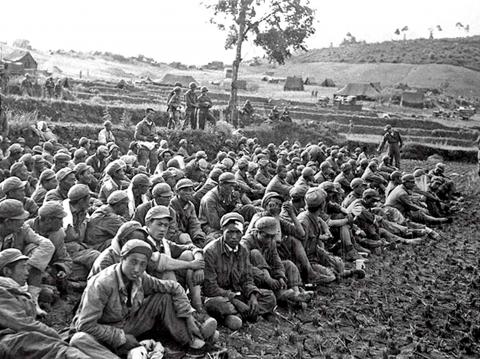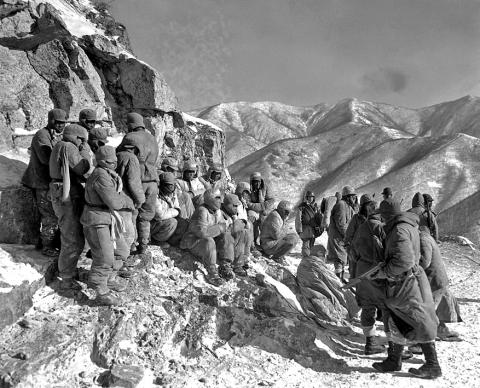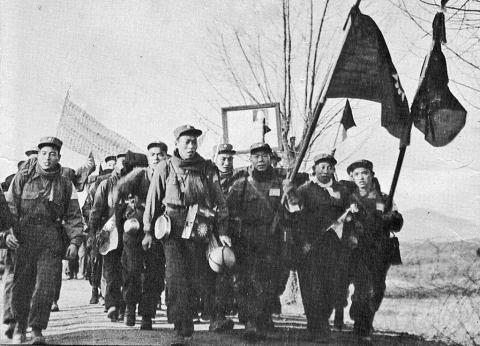Taiwan in Time: Jan. 18 to Jan. 24
After more than two years in an Allied prisoner of war camp on what is now South Korea’s Jeju Island, Lee Mao-jen (李茂仁) recalls the moment he was set free. His group of 30 fellow Chinese Communist soldiers stepped out of the barbed wire fences and posed for a photo.
“They told us to head right if we wanted to go to Taiwan, and left if we wanted to go elsewhere,” Lee says in an oral history book published by Academia Historica.

Photo courtesy of Wikimedia Commons
It wasn’t a difficult decision. A former KMT soldier, Lee was captured by the communists at the end of the Chinese Civil War and forced to serve in the enemy’s army. Just a year later, he was ordered to aid the Korean communists in the Korean War, where he became one of about 21,300 Chinese soldiers placed in Allied prisoner of war camps. He thought about what would happen to him if he chose China.
Between Jan. 23 and Jan. 27, 1954, about 14,000 Chinese prisoners, including Lee, landed at Keelung harbor. Jan. 23 has been observed in Taiwan and South Korea as World Freedom Day (世界自由日) ever since.
Much of the peace talks after the ceasefire focused on prisoners of war, as the Allies had captured far more than their enemies. The Americans wanted to give the prisoners a choice where to go for “respecting personal choice, increasing the military force of the Republic of China and preventing these people from becoming victims of the Chinese Communist Party after they return,” writes historian Chou Hsiu-huan (周秀環) in a study. They also believed that this tactic would serve as incentive for future enemies to surrender.

Photo courtesy of Wikimedia Commons
After two years of negotiation, the US got its way. About 7,000 prisoners decided to return to China, while the rest decided on Taiwan.
Chou writes that about two-thirds of the arrivals were originally KMT soldiers left behind in China, and that conflicts often erupted in the camps between pro-communist and anti-communist soldiers.
The reason so many decided on Taiwan isn’t an easy question to answer and depends on who you talk to. The official KMT version follows the rhetoric in those days of resisting the evil communists and running toward freedom. Some say they were unhappy about their treatment by the Chinese army and believed that Taiwan offered a better life. Some say that many who decided to return to China were either volunteer soldiers who never fought for the KMT, or teenagers who wanted to return to their families.

Photo courtesy of Wikimedia Commons
Most prisoners had anti-communist tattoos on their body to show their loyalty to their new government, but reports also show that some of them were forcefully tattooed by anti-communist prisoners during their conflicts and had no choice but to choose Taiwan.
Of course, the Chinese side attributed it to the Allies “re-educating” the prisoners with anti-communism propaganda — which is not an empty accusation. Chang Pu-ting (張步庭), a former prisoner, recalls having to attend “political education classes” (政治教育) taught by instructors from Taiwan, along with mandatory Bible studies.
On Aug. 6, 1953, the KMT announced that citizens should refer to these prisoners as “respectable anti-communist martyrs,” “anti-communist warriors” and “our dear compatriots.”
The first term stuck, and later would be applied to Chinese soldiers who defected to Taiwan.
Tung Hsiang-lung (董翔龍), minister of the Veterans Affairs Council and former navy admiral, sums up the significance of these “martyrs” to the government back then in a 60th anniversary commemorative publication.
“They were like a boost to the heart during the country’s unstable early 1950s,” Tung writes. “They gave us confidence, hope and a chance for the international community to re-understand and accept us. Their spirit of choosing democracy over dictatorship and death over freedom is still a guiding force in human society today, and we should not forget about these people.”
Their story was made into a movie in 1961, and the soldiers were widely praised as heroes and examples of righteous citizens. A book of essays by the soldiers was published in 1986, mostly detailing their new lives and their love of freedom.
Most of them continued on as soldiers in Taiwan until they retired.
Taiwan in Time, a column about Taiwan’s history that is published every Sunday, spotlights important or interesting events around the nation that have anniversaries this week.

Taiwan has next to no political engagement in Myanmar, either with the ruling military junta nor the dozens of armed groups who’ve in the last five years taken over around two-thirds of the nation’s territory in a sprawling, patchwork civil war. But early last month, the leader of one relatively minor Burmese revolutionary faction, General Nerdah Bomya, who is also an alleged war criminal, made a low key visit to Taipei, where he met with a member of President William Lai’s (賴清德) staff, a retired Taiwanese military official and several academics. “I feel like Taiwan is a good example of

March 2 to March 8 Gunfire rang out along the shore of the frontline island of Lieyu (烈嶼) on a foggy afternoon on March 7, 1987. By the time it was over, about 20 unarmed Vietnamese refugees — men, women, elderly and children — were dead. They were hastily buried, followed by decades of silence. Months later, opposition politicians and journalists tried to uncover what had happened, but conflicting accounts only deepened the confusion. One version suggested that government troops had mistakenly killed their own operatives attempting to return home from Vietnam. The military maintained that the

Jacques Poissant’s suffering stopped the day he asked his daughter if it would be “cowardly to ask to be helped to die.” The retired Canadian insurance adviser was 93, and “was wasting away” after a long battle with prostate cancer. “He no longer had any zest for life,” Josee Poissant said. Last year her mother made the same choice at 96 when she realized she would not be getting out of hospital. She died surrounded by her children and their partners listening to the music she loved. “She was at peace. She sang until she went to sleep.” Josee Poissant remembers it as a beautiful

Before the last section of the round-the-island railway was electrified, one old blue train still chugged back and forth between Pingtung County’s Fangliao (枋寮) and Taitung (台東) stations once a day. It was so slow, was so hot (it had no air conditioning) and covered such a short distance, that the low fare still failed to attract many riders. This relic of the past was finally retired when the South Link Line was fully electrified on Dec. 23, 2020. A wave of nostalgia surrounded the termination of the Ordinary Train service, as these train carriages had been in use for decades